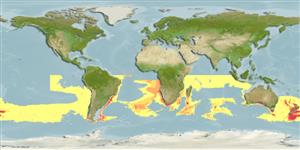Teleostei (teleosts) >
Scombriformes (Mackerels) >
Centrolophidae (Medusafishes)
Etymology: Schedophilus: Name from Greek words 'phylos' (Φίλος), t) meaning 'one who likes' and "s 'shedia' (Σχεδία) which means raft; literally means 'the one who likes rafts'. This probably refers to the lifestyle ot the juveniles of this genus (Michail Ragousis, mar10091@marine.aegean.gr, pers. Comm. 01/16) which are epipelagic and associate with floating jellyfish..
More on author: Günther.
Environment: milieu / climate zone / depth range / distribution range
Ecology
Marine; pelagic-oceanic; oceanodromous (Ref. 51243); depth range 300 - 1110 m (Ref. 44037), usually 300 - 700 m (Ref. 54802). Temperate
Southern Ocean: in widespread localities including southern Africa.
Size / Weight / Age
Maturity: Lm ? range ? - ? cm
Max length : 30.0 cm TL male/unsexed; (Ref. 4410)
Adults are pelagic in oceanic waters. Juveniles found beneath jellyfish (Ref. 9563), in epipelagic waters (Ref. 54802). Rare species with no commercial value (Ref. 54802).
Life cycle and mating behavior
Maturities | Reproduction | Spawnings | Egg(s) | Fecundities | Larvae
Haedrich, R.L., 1986. Stromateidae. p. 842-846. In M.M. Smith and P.C. Heemstra (eds.) Smiths' sea fishes. Springer-Verlag, Berlin. (Ref. 4410)
IUCN Red List Status (Ref. 130435)
Threat to humans
Harmless
Human uses
Tools
Special reports
Download XML
Internet sources
Estimates based on models
Preferred temperature (Ref.
123201): 2.1 - 12, mean 7.6 °C (based on 639 cells).
Phylogenetic diversity index (Ref.
82804): PD
50 = 0.5039 [Uniqueness, from 0.5 = low to 2.0 = high].
Bayesian length-weight: a=0.01380 (0.00555 - 0.03435), b=3.06 (2.85 - 3.27), in cm total length, based on LWR estimates for this (Sub)family-body shape (Ref.
93245).
Trophic level (Ref.
69278): 3.3 ±0.46 se; based on food items.
Resilience (Ref.
120179): Medium, minimum population doubling time 1.4 - 4.4 years (Preliminary K or Fecundity.).
Fishing Vulnerability (Ref.
59153): Low vulnerability (20 of 100).
